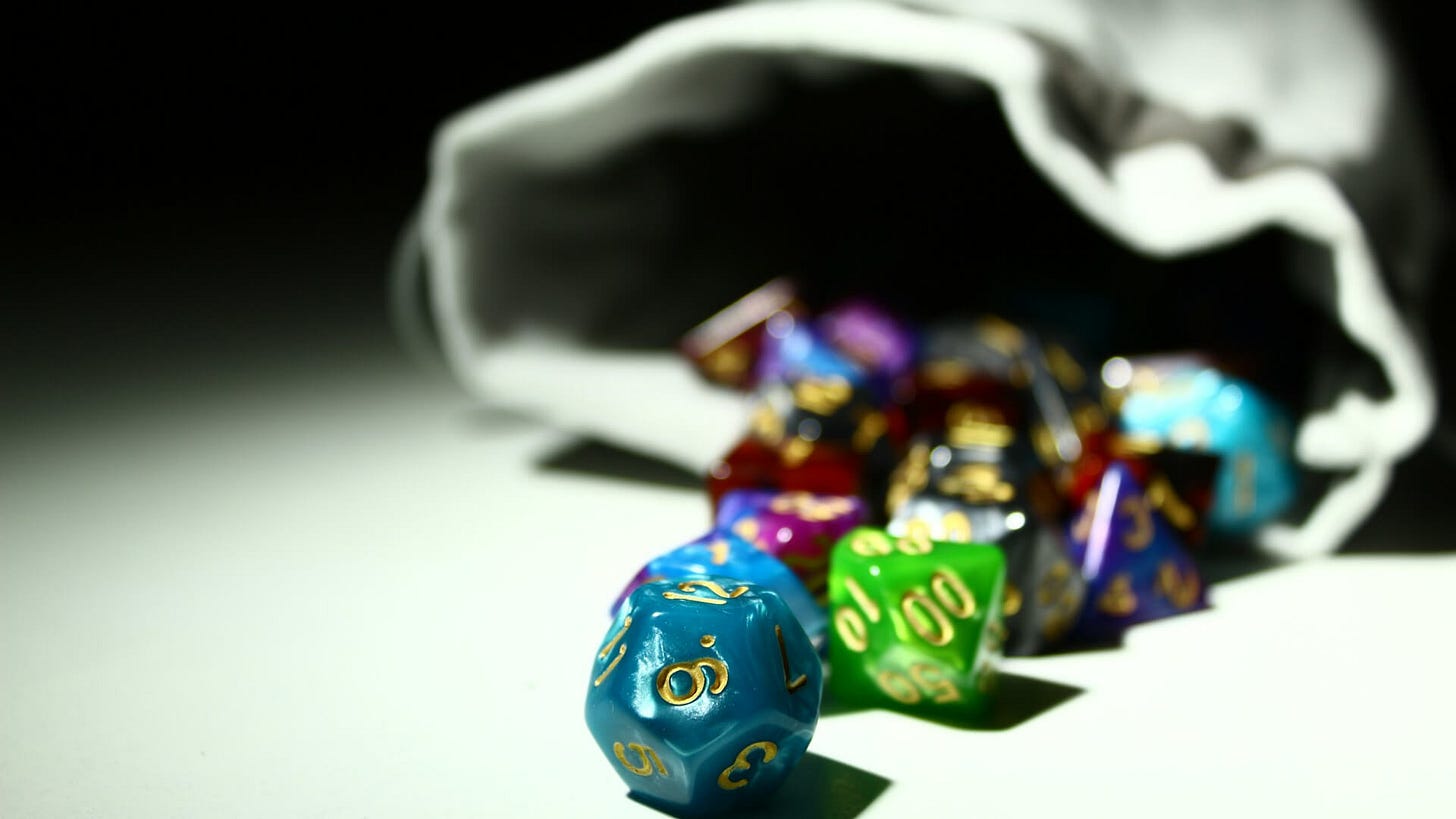GM Thoughts: When Should Players Roll Dice?
Dice are a big part of most role-playing games. They’re so common that even people who don’t play RPGs recognize what a d20 is and think of that game. Some systems (including some really good narrative systems) use other ways to decide outcomes, but dice still rule the table.
What do we use dice for? To add the element of chance that makes an RPG feel like a real game to many players. Dice can resolve almost anything: random encounters, sword swings or even a clever bluff.

But when should players roll dice? The common go-to answer is “whenever the outcome is uncertain.” This is taken to an extreme in the tongue-in-cheek Roll for Shoes. True to its title, it’s not 100% certain your character remembered to put on footwear that morning, so you have to roll dice.
On the other end of the spectrum is trying to hide in Mothership. There aren’t any stealth skills or feats in the system, so you can’t roll dice to see if you succeed. Instead, you have to describe exactly how you’re hiding and hope your idea fits the fiction well enough to convince the Warden.
What About Limiting Dice Rolls?
Reading Clayton Notestine’s The 1 HP Dragon (linked below), got me thinking: what if fewer things were uncertain? What if most actions just work because the player said their character did it?
In my Komodo system, I’ve been using lock-picking as a thought experiment. If the character knows how to pick locks and they aren’t under any pressure, shouldn’t they just…do it? No roll, the player simply declares “I pick the lock and enter the building". Picking the lock only requires a roll if there is some kind of time limit or other complication.
This is the way the Universal Role-Playing system works, so I know I’m not the first one with the idea.
But Rolling Dice is Fun!
On the other hand, players like rolling dice (at least my players do). I like rolling dice, whether as a player or as a GM, and I’m sure I’m not alone. Heck, I bet a lot of players even like when GMs roll dice. There’s something exciting about that moment of uncertainty that makes the game more fun.
So maybe the answer isn’t limiting dice rolls, but giving better context to what dice rolls mean.
Judd Karlman of Daydreaming about Dragons used an example of searching a desk in Blades in the Dark. A failed roll shouldn’t mean “you don’t find it”, but rather “you found it, but you made a mess.” The failure means that someone will know the desk was searched and that something is missing.
Back to my lock-picking example: imagine there are guards patrolling the area. The character picks the lock, but if they fail the guards notice something wrong as they pass by the door.
This approach is closer to the “degrees of success” or “failing forward” style used in some systems. It lets players succeed while keeping things interesting.
Mixing Approaches
On the other other hand, maybe a blended approach is best. How the dice are used depends on the importance of the action. I used a similar approach for defining turns in a previous post:
For a trivial action, something that isn’t important to the story, the outcome is just given. “You pick the lock to [friendly NPC]’s house easily and are waiting inside when they arrive home.”
A minor action, something that is important to the story but still relatively easy for the character, can be degrees of success. “You pick the lock and slip inside the building before the guards return, but you woke up the dog inside.”
This can also be a good way to reward a player for a really fun or clever idea. Maybe getting in the building was originally a major combat encounter, but instead the player proposed learning the guards’ patrol schedule and entering quietly. Then the actual lock-picking becomes a minor action instead.
A major action, something important to the story that is supposed to be hard, might be a pass or fail. “Your pick snaps off in the lock. There’s no way you can pull the broken end out and finish picking the lock before the guards return. What do you do?”
That last one depends on there being other ways for the story to advance without the character picking the lock.
What Do You Think?
Am I on the right track here? When do you have players roll? What do those rolls mean in your game?
Leave a comment! I’d love to hear how other GMs handle this.
Other Thoughts
Clayton Notestine treats combat like a puzzle. The players don’t even get to roll until they can solve the puzzle: The 1 HP Dragon
Colin Spiridinov uses narration-only interactions as a way to get player characters to deeply interact with NPCs and their motivations:
Matt Colville suggests calling for a roll only when the GM can provide an interesting result for both success and failure:
Mike Mearls suggests that gaming needs some narrative-only elements that can significantly affect play without needing a specific mechanic:




Thanks for the shoutout! I was reading the article and thinking “wow this is well written i agree with all this” until I saw my article at the bottom and was like oh yeah i wrote about this topic too.
Really liked your point about rolling dice being fun and allowing dice rolls to generate additional consequences even if the players succeed. I think that’s helpful advice, especially in scenarios where failing to do the thing (search the desk, pick the lock) wouldn’t be very interesting and wouldn’t move the story forward.